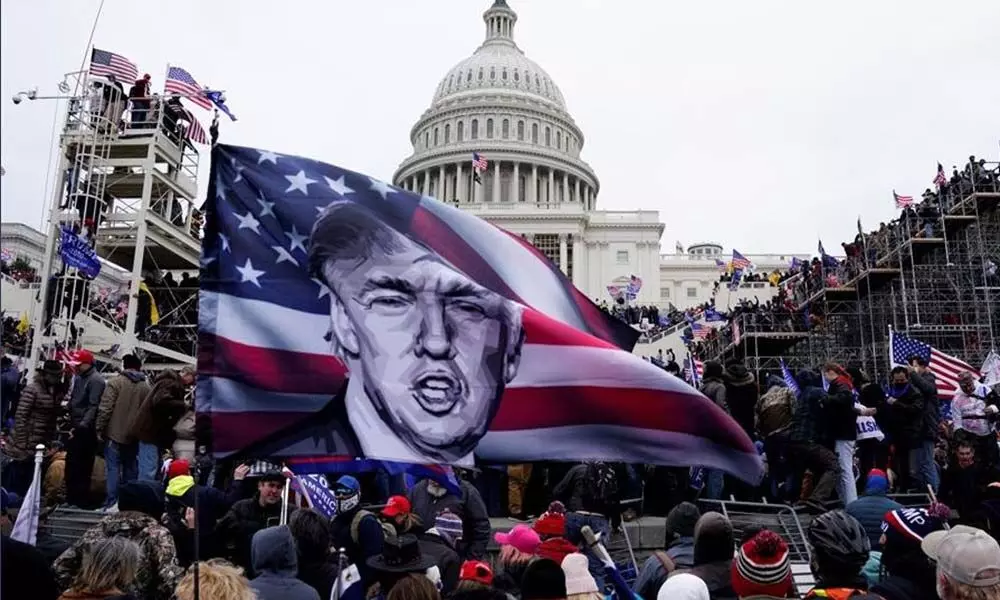Biden has to face 'Trump'eters abroad
Ivanka Trump made a protocol-defying, quasi-state visit to India
image for illustrative purpose

OVERTURNING: Donald Trump's "Muslim ban," abandoning his border wall and making masks mandatory on federal property, President Joe Biden has started to cage, in his first week, the beast that is Trumpism. He is supported in this vital task at home by a political and media consensus which is nearly bipartisan after the mob assault on the Capitol - that Trump and his diehard supporters are a serious menace to social, economic and political order.
The new president's toughest confrontation with Trumpists, however, will take place abroad, especially in countries such as India and Britain where they remain empowered.
Trump himself had no greater allies and soulmates internationally than politicians and journalists in these two fallen democracies. In the lead-up to Brexit, Barack Obama correctly identified Boris Johnson as the British version of Trump. (Johnson had dog-whistled about the then-US president as being "part-Kenyan.")
Trump himself egged on the mendacious campaign for Brexit and the Brexiteers naturally celebrated his victory in 2016, claiming that, as Johnson's close associate Michael Gove put it, they now had a "warm and generous friend" in the White House.
In early 2017, then-Prime Minister Theresa May rushed to Washington DC to hold Trump's hand and to invite him to make a grand state visit to the UK.
India's Hindu nationalist government stroked Trump's vanity even more assiduously. In 2017, Ivanka Trump made a protocol-defying, quasi-state visit to India where she co-inaugurated with Indian Prime Minister Narendra Modi an entrepreneurship summit in Hyderabad. At a vast 2019 gathering of Indian Americans in Houston, Modi clutched Trump's hand more robustly than May had and came dangerously close to endorsing his re-election.
Preparing to visit India in early 2020, Trump boasted on Twitter that his Indian bromancer had promised him an audience of "5 to 7 million people" in Gujarat. The actual turnout was close to 1,00,000. Still, Trump was gratified enough to use clips from the rally in his re-election campaign.
Like the Brexiteers, the Hindu nationalists found in Trump a president prone to approve or at least not care about their destruction of institutions and norms. During Trump's tenure, Modi revoked the constitutionally guaranteed autonomy of Kashmir and introduced explicitly anti-Muslim legislation.
Hindu nationalists could even count upon Trump to remain indifferent when in February 2020 police and Hindu fanatics launched murderous assaults on Muslims a few miles away from where he was meeting Modi in New Delhi.
Moreover, Trumpism's British and Indian avatars received some extraordinary support from journalists and broadcasters. Trump's support base among mainstream opinion-makers in the United States remained largely confined to Rupert Murdoch's media and fringe right-wing outlets; he could only envy the devotion India's news-entertainment channels showered upon Modi, even as the latter's decisions tore at India's economy and social fabric. In Britain, the Daily Telegraph and the Spectator as well as tabloids cheered Johnson through a miasma of falsehoods into high office. Murdoch's expanding media empire finds in Britain today a rather posh home for its brand of fake news and conspiracy theories.
Of course, with Trump comprehensively disgraced and the pandemic still raging, some British Trumpists are busy right now, as the Economist put it, "scrubbing their CVs of any hint of Trumpery."
Unfortunately for them, such revisionism cannot work in the age of the internet. A few seconds of Googling will expose some toe-curling British tributes to Trump: For instance, Douglas Murray, a senior editor at the Spectator, hailed him in 2017 for "reminding the West of what is great about ourselves and giving an unapologetic defense of that greatness."
A bigger problem for many British Trumpists is that Biden seems even less keen than the part-Kenyan Obama on Brexit, or Britain in general. As he succinctly put it last year to a BBC journalist, in a video clip that went viral: "I'm Irish."
Hindu supremacists would be right to worry, too, about Biden's invocation in July 2020 of India's "long tradition of secularism." While Hindu nationalists rejoiced as Kamala Harris became the first Indian-American vice president, they're less inclined to remember her assertion in 2019 that "we have to remind the Kashmiris that they are not alone in the world."
Politicians often don't uphold beliefs they have expressed in campaign mode. Geopolitical interests come to dictate their policies when they assume power.
Nevertheless, there is no discounting the moral challenge before Biden and Harris. The world will be watching how, as Trumpism licks its wounds at home, the Biden administration deals with its fellow travelers abroad. (Bloomberg)

